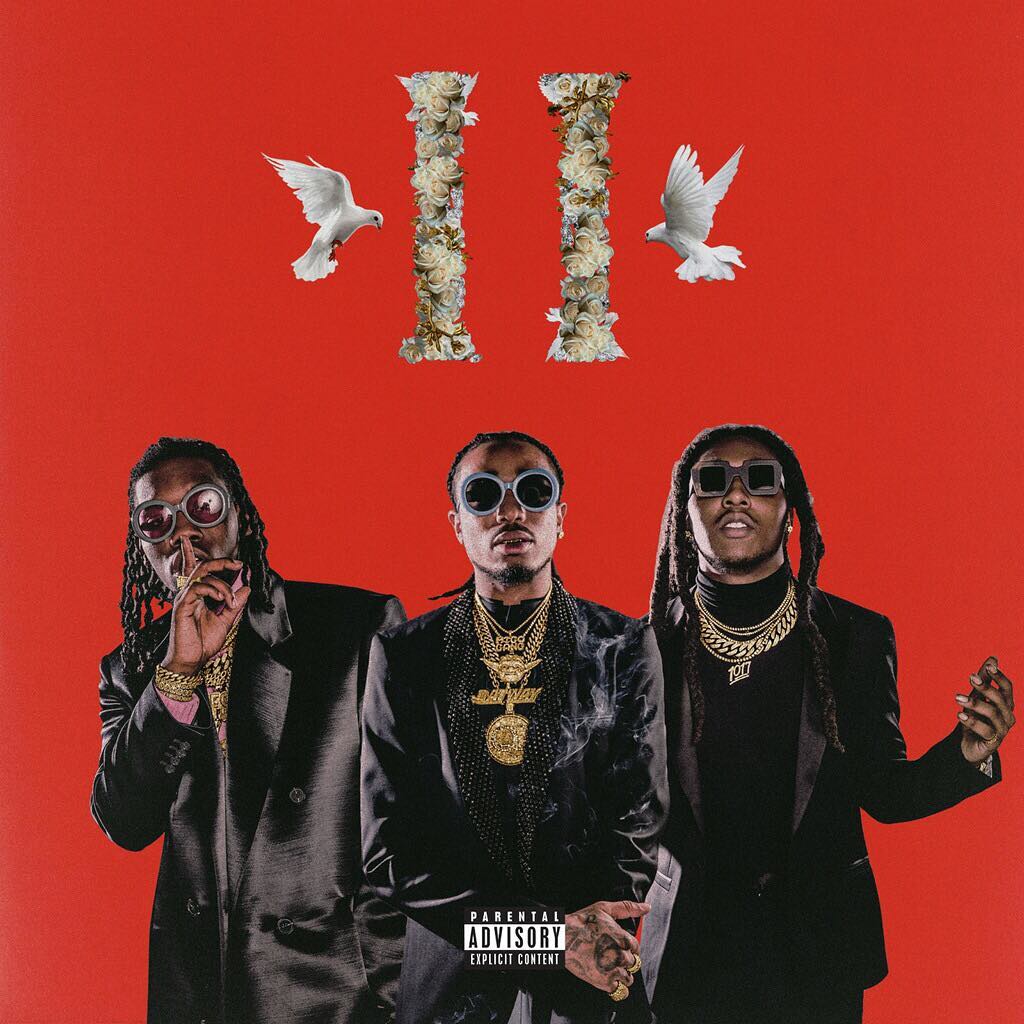We Speak Music
Migos Culture II Album Review

m Culture is a move so ballsy it feels like trolling if you can’t back it up. And last year, the Migos did: Culture was the resilient Atlanta trio’s best album, but it also felt like a moment, arriving right at the crest of a monster wave of hard-fought acclaim. A lot of that had to do with “Bad and Boujee,” the group’s first No. 1 single, but what made Culture exceptional was more than just chart positioning. Suave and streamlined, it was proof that the Migos were capable of more than they’d been given credit for circa “Versace”—a real album’s album that elevated the group’s style without sacrificing what made people love them to begin with. They’d officially infiltrated the mainstream without going pop; instead, pop had gone Migos. All of it just felt right.
The Migos’ best quality is their ability to present truly virtuosic rapping in ways that are commercially viable, and it would be ridiculous to suggest that Offset, Takeoff, and Quavo’s talents have diminished since Culture’s release. But if Culture marked the very peak of the Migos’ triumphal arc, buoyed by a swell of goodwill, Culture II is simply… here, arriving in the wake of a handful of solid but inessential singles that hardly compare to the zeitgeist-dominating force that was “Bad and Boujee” or “T-Shirt.” It’s hard to say what Culture II adds to our appreciation of Migos in ways that don’t feel redundant: Yes, the trio is still incredibly successful, still ridiculously wealthy, and hey, one of them’s engaged to Cardi B! Where Culture was an event, its sequel feels more like an occurrence, the quality of its songs handicapped by the artlessness of its presentation.
The first thing to note about Culture II for anyone who may have made non-Migos-related plans for their leisure time is that it is long—dauntingly so. Its 24 tracks range across one hour and 45 minutes of digital space. Maybe the Migos just had thatmany ideas they simply could not deign to edit down. But it seems more likely to be another attempt to game the current Billboard and RIAA rules, in which 1,500 individual song streams count towards one full album sale (thus, the more songs on an album, the higher and faster it charts). It’s a familiar play from Migos’ label, whose “Quality Control” moniker feels fairly ironic here; last month, they released the 30-track Control the Streets Vol. 1 compilation, 22 of which featured Migos or some combination of its individual members. And currently pinned to the top of Migos’ Spotify page under “Artist’s Pick” is not Culture II, the album, but a 72-track playlist that repeats the album’s tracklist three times in a row. It’s not like this kind of craven opportunism is a recent development in the music industry, but it feels pretty dark all the same.
All this power-grabbing does a significant disservice to the songs here, most of which are good to great. In fact, there are two strong projects to be culled from Culture II’s sprawl: an album-quality selection of slick, playful nudges in experimental but chart-friendly directions on one side, and a mixtape’s worth of expensive updates to the O.G. Migos sound on the other. The lonesome sax solos wafting through “Too Playa” pair elegantly with the muted horns on Kanye co-production “BBO (Bad Bitches Only)” and the loungy “Made Men,” on which Takeoff’s adlibs feel like the intimate asides of a ’70s soul singer. On “Stir Fry,” the trio step outside their comfort zone with a Pharrell beat originally intended for T.I. circa 2008. “On the nose” doesn’t begin to describe “Narcos,” with its Latin guitar, “arriba!” ad-libs, and the best-worst drug lord accent attempt since “Tony Montana”—but if that’s not exactly what you come to a Migos song for, then Offset’s standing ovation-worthy second verse is. “I ain’t really with the razzle-dazzle/Knock him off and then I throw him off the boat paddle/Go to Tijuana, put the kilo on the saddle,” he raps with stunning precision, a reminder of why it’s worth it to trek through nearly two hours of material.
This isn’t to say that the “mixtape half” of Culture II is underwhelming, exactly; there’s a lot that works here, from the cosmic Ren Faire chords of “Supastars” (though it’s a weird choice for the album’s third single) to the haunted “Crown the Kings,” whose waterlogged vocal samples evoke a trapped-out Kate Bush. But the farther you journey into the album’s increasingly sleepy second half, the harder it is for these songs to hold your attention for much longer than a verse and a couple hooks. Even the song structures themselves start to feel formulaic: each of the album’s first nine songs opens with a Quavo hook leading into a Quavo verse, to the point where it’s often a full two minutes in before we hear anything beyond ad-libs from his compadres. “Too Much Jewelry” finally breaks free from the repetitive template: a Zaytoven-produced Gucci Mane homage and a showcase for Takeoff, who regularly steals the spotlight on Culture II even when relegated to a song’s final verse. The youngest Migo’s turn on the sultry bounce of “Gang Gang” is the album’s biggest surprise, his gravelly baritone holding down the melodic duties usually relegated to Quavo with unexpected grace.
It’s still a joy to hear the Migos rap, which is why it’s especially depressing that Culture II ultimately feels like a drag—a formless grab bag compiled without much care. Perhaps this is a hopelessly old-fashioned way of thinking; after all, there’s nothing stopping anyone from creating a playlist of our own, trimming and rearranging the album’s 24 tracks exactly to our satisfaction. And frankly, given the choice between pleasing critics with concise, thoughtful works like Culture or appeasing every fractured sector of one’s fanbase while boosting sales numbers—well, it’s not exactly a tough call. Maybe the culture is already too deep into its “album as outlet mall” moment—an endless, unedited data dump ready to be whatever we want it to be. But culture and art do not always share the same priorities.
We Speak Music
EMEREE’s Cinematic Pivot in ‘Eyesore’ from Pop Star to Pop Assassin

EMEREE doesn’t just make music—she curates moments. Her latest single “Eyesore” is a cinematic, sarcastic scorcher that sets a new tone for the rising Australian powerhouse. From the candy-coated production to the horror-tinged DIY music video, EMEREE is creating her own genre: camp pop noir.
The single is a masterclass in balancing artistry with attitude. Co-created with Christian Tjandrawinata, “Eyesore” proves EMEREE isn’t here to play safe. She plays sharp, with razor-lined harmonies and lyricism that stabs with a smile. It’s not just catchy—it’s calculated. The beat bounces, the vocals glide, but it’s the burn in the lines that lingers.
Visually, EMEREE doubles down. The music video is a bloody wink to 80s slasher films, with a narrative as satirical as it is symbolic. She doesn’t just kill her ex on screen—she kills the whole trope. Pop stars often tell stories of heartbreak. EMEREE turns it into performance art.
EMEREE says, “Eyesore” is the anthem for anyone who’s ever dated someone who treated them horribly and just wasn’t hot enough to get away with it.”
EMEREE is making noise for all the right reasons—and with creative backing from CAA and sessions alongside Nile Rodgers and Invisible Men, she’s not just rising. She’s plotting her pop empire. “Eyesore” is both a warning shot and a love letter to anyone who’s ever made revenge their aesthetic.
It’s the start of something bold—and we’re already obsessed.
-

 We Speak Music1 week ago
We Speak Music1 week agoSinger/Songwriter Aro Rose To Release Highly Anticipated New Single “Live Without You” On June 29th, 2025
-

 We Speak Soccer1 week ago
We Speak Soccer1 week agoFrom Small Steps to Big Goals: How Alianna-Reyne Basa Became a Fearless Striker with a Champion’s Heart
-

 We Speak Soccer1 week ago
We Speak Soccer1 week agoBrylee Tagle: Crafting Excellence on the Soccer Field with Vision, Confidence, and a Passion for the Game
-

 We Speak Volleyball1 week ago
We Speak Volleyball1 week agoEyes on the Ball, Heart in the Game: Ryan Jomo’s Volleyball Journey as a Libero Who Refused to Settle for Less





















